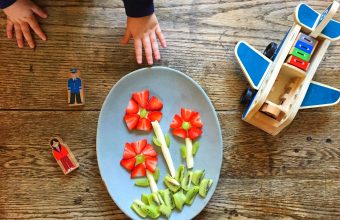Many toddlers express their budding independence through eating—or not eating, as is so often the case— resulting in almost all toddlers going through a phase where they flat out refuse to eat. While these food strikes may leave you feeling frustrated and worried, it’s incredibly common and rarely anything to fuss over.
Toddlers are notoriously fickle dining companions, and so many things can affect their ability to eat: sickness, teething, change in routine, and a straight-up struggle for some independence. They may also be too tired to eat if dinner is being served close to bedtime, or it’s possible they just aren’t hungry, especially if they spend a lot time grazing throughout the day. So, what’s a concerned parent to do when their toddler refuses to eat dinner (or any other meal)?
According to the Canadian Paediatric Society, absolutely nothing.
Let Your Kids Determine How Much to Eat
While doing nothing may sound ludicrous to some, letting your kids determine how much (and even if) they will eat at a meal time is best. A parent’s job is to provide a well-rounded and balanced diet made up of wholesome nutritious food, and a toddler’s job is to determine how much of each meal they will eat. If your child is thriving, growing and gaining the appropriate amount of weight, don’t fret if they miss a few meals.
For extra reassurance, here’s some food for thought from the Canadian Paediatric Society: kids experience a natural dip in appetite around age two, when growth begins to slow down. So, it’s possible the refusal to eat isn’t just an act of defiance, but rather an expression of not feeling hungry.
Despite the recommendations to trust your toddler to know how much they need to eat at each meal, there are some things you can do.
Steps You Can Take to Help Get Your Kids to Eat Well:
Keep screens and toys away from the table, however, in my experience a captivating book that you read with them while they eat can be helpful in getting them to sit still.
Don’t be a short order cook. Offer one dinner for the whole family – but be accepting of some food dislikes – and avoid making a separate meal for each person at the table. Once you start you’ll never be able to stop.
Keep offering. The best way to encourage a toddler to learn to like a food is to continuously offer it, even when they try to tell you they don’t like it. It can take up to 15 tries to get kids to taste (and hopefully like) a new food. Always try to pair something unfamiliar and/or unloved with something familiar and beloved.
Suggest that each eater under 12 takes a “thank you” portion to show gratitude to the cook. The portion size is related to a child’s age, so a two-year-old would take two bites, a three-year-old three bites, etc.
Be sure you’re setting a good example! Serve nutritious foods that you like or eat something new so your kids see you doing the very thing you’re asking them to
Don’t create power struggles around food, and don’t negotiate. You can encourage kids to try “one more taste” but the battle for bites is one that parents rarely win so it simply isn’t worth the struggle.
Have set times for meals and snacks. And try to stick to them.
Determine if they’re actually hungry. Sometimes when a toddler refuses to eat or try a new food, they aren’t hungry enough for a meal. Excuse them from the table and try again 30 minutes later.
Tell us, are your toddlers refusing to eat their meals these day? If so, let’s commiserate together. My notoriously happy eater, who’s just passed the two-and-a-half mark, is expressing some seriously strong opinions about what he will and won’t eat these days. It’s frustrating for sure, but I just keep reminding myself that he will eventually grow out of it. (And they do, I promise!).
Tagged under: dinner,picky eater,toddler meals,toddler food,picky eating solutions,toddler eating
Category: food






